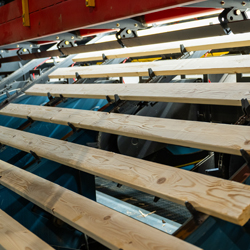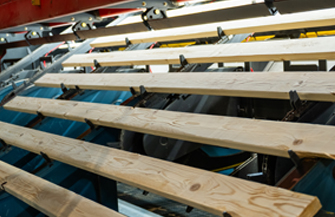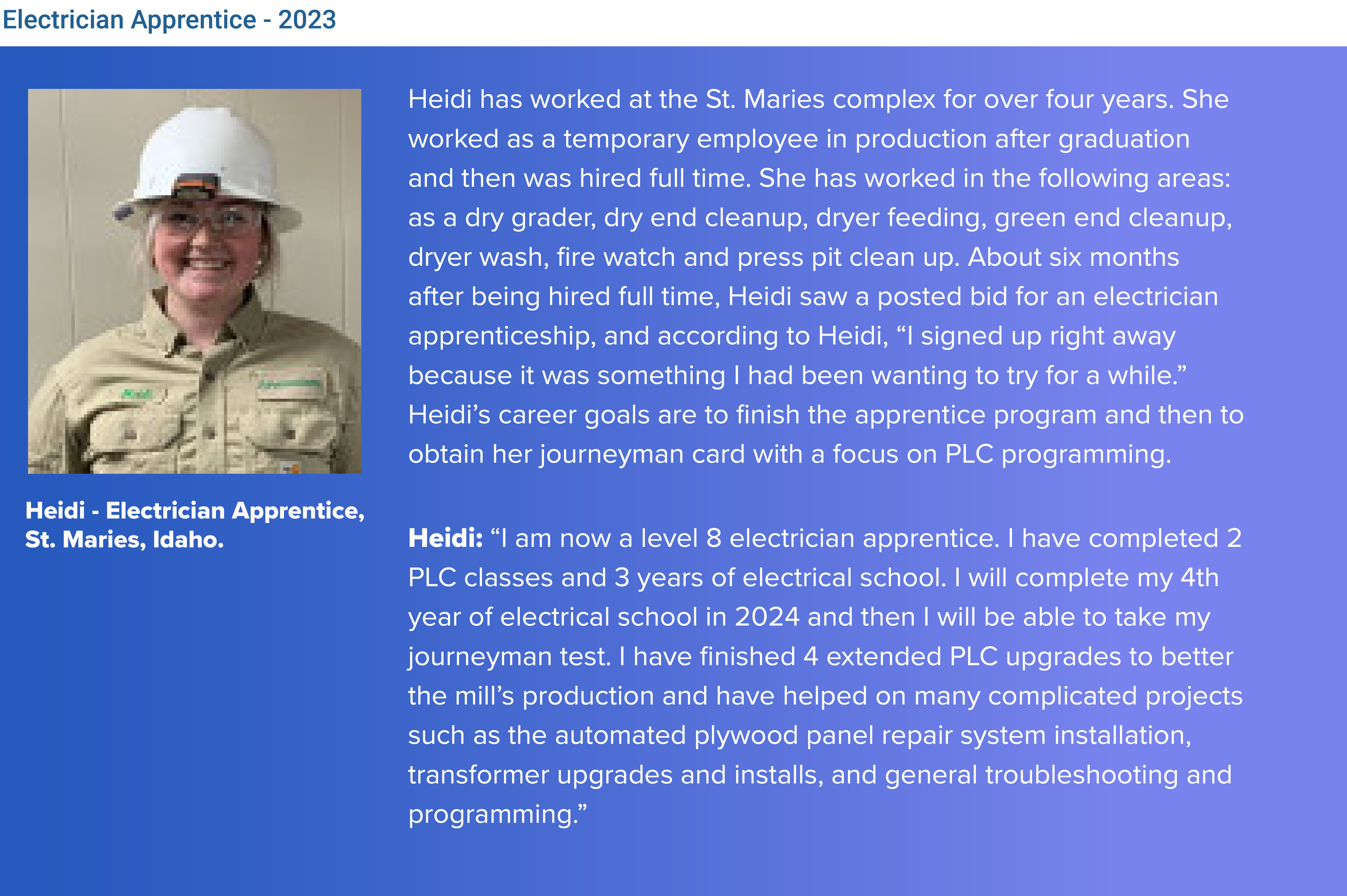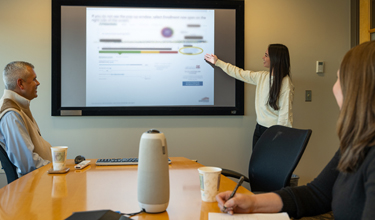

Leadership Training
Strong leadership fuels organizational success. Recognizing the importance of cultivating leadership talent from within, PotlatchDeltic launched the Emerging Leaders Academy in 2024. Designed in collaboration with the University of Arkansas, this six-month intensive program equips high-potential employees with the confidence, skills, and network they need to thrive in future leadership roles.
The academy’s structure emphasized both learning and application. Over six months, participants engaged in interactive virtual sessions, each focused on a critical leadership skill, such as navigating change, fostering emotional intelligence, delegating effectively and leading resilient teams. Each session challenged participants to apply concepts in real time through role play scenarios, then reflect on their experiences in small-group discussions.
To cap off the program, participants gathered for an immersive in-person session at the University of Arkansas, where they had an opportunity to interact directly with PotlatchDeltic’s executive team, including CEO Eric Cremers, who shared insights on resilience and decision-making, highlighting the challenges leaders face. The experience wasn’t just about learning general leadership principles, it was about preparing managers to lead with confidence in real-world scenarios impacting our business.
PotlatchDeltic selected 15 high-performing managers from each division of our business. These individuals, each managing at least one direct report, represented different locations and business units. Bringing together leaders from different backgrounds not only enriched discussions but also accelerated real-world application.
The impact of the Emerging Leaders Academy was immediate: one participant, who was promoted shortly after completing the program, was equipped with the skills, confidence, and network to succeed in his new role. Many attendees reported immediate application of skills, particularly in handling difficult conversations and navigating change. In addition to leadership skills, participants had a chance to build connections with other leaders in our company, exchange ideas and form lasting professional relationships. With these new connections and skills in place, the momentum for leadership growth continues to build.
Based on the program’s strong reception, PotlatchDeltic is set to launch a second cohort of the Emerging Leaders Academy in 2025, keeping the small-group format to promote deep engagement. By investing in structured, high-impact training like this, PotlatchDeltic is preparing individuals for leadership roles, which we believe is a fundamental part of building a stronger, more resilient company for the future.


Strap Apprenticeship
The School to Registered Apprenticeship Program (STRAP) offers Idaho students aged 16 and over an opportunity to apprentice in certain occupations while completing high school. The student is paid first year apprenticeship wages and is provided with work-based learning experience including instruction, supervision, and safety training. Upon graduating high school, students can complete their apprenticeship with an advancing wage scale. Once the apprentice completes the program, he or she can acquire a national credential in that occupation and advance to a journey worker pay scale. PotlatchDeltic meets child labor requirements.
In 2024, we had two participants in the program, and both accepted full-time positions at our St. Maries, Idaho facility upon high school graduation. Freddie and Riley are now both millwright apprentices Level 2.



Electrician Apprenticeship – St. Maries
Our St. Maries, Idaho facility’s electrician apprenticeship program consists of a combination of online/classroom coursework and practical experience. Electrician apprentices must accrue 8,000 hours of on-the-job work experience and are required to be enrolled in an accredited electrician apprenticeship school for their classroom training. For our program, apprentices can partner with either North Idaho College or the College of Southern Idaho.
Candidates take an average of four years to complete the eight levels of the electrician apprenticeship. Each of those four years requires 144 hours of instruction, for a total of 576 hours. The schooling focuses on electrical codes, wiring, finish work, troubleshooting, motor installation and controls. Our apprentices also enroll in Programmable Logic Controller classes.
Electricians at St. Maries perform integral tasks in our wood products operations. Properly working electrical tools, wiring, fuses, receptacles, circuits, and motors, to list only a few items, are a vital part of a mill running efficiently. First and foremost, the electricians are responsible for complying with all Occupational Safety and Health Act safety protocols and to work in accordance with the rules and regulations of the National Fire Protection Association and special local regulations. For example, lock out/tag out systems are a primary mill safety system that electricians must install, maintain, and repair and are critical for all workers at the mill. Everyday tasks can also include rough-in wiring for switches, receptacles, circuits, motors, and fuses; preparing sketches or following blueprints to determine the location of wiring or equipment and to ensure conformance to building and safety codes; diagnosing, troubleshooting, and repairing all types of malfunctioning electrical systems; and providing input to management for capital planning on longevity of electrical systems.
At the end of 2024, we had eight electrician apprentices at various stages of training at our St. Maries, Idaho lumber and plywood facility. The program offers Team Members a way to acquire skills and certification in a trade that is in high demand in our industry today, and in turn provides our company with a consistent source of skilled labor talent. Many of the Team Members who have participated in apprenticeships have now successfully completed the program and are currently working as fully qualified electricians at our facilities. Further, once an apprenticeship is completed the apprentice can take the journeyman state test to get their journeyman card. We have had eight apprentices move on to journeyman status after their program was completed over the last five years.





Bemidji Mechatronics Training
Responding to a growing need for increased technical skills among the workforce in Bemidji, Minnesota, PotlatchDeltic worked with The Idea Circle, a workforce development consultant, the Minnesota Innovation Initiative (MI2), an affiliate of the local chamber of commerce, and other private, local employers to create a mechatronics program. The Mechatronics program is focused on building competency for maintenance and repair on electrical, mechanical, computer, robotics, and automation systems. The courses are available to any eligible Team Member in our Bemidji mill (production or maintenance) who wants to advance their skills in these areas.
In 2013, PotlatchDeltic became the first company in the Bemidji area to enroll one of its Team Members, Joe, in the Mechatronics program. Joe had just graduated from high school and came to PotlatchDeltic as a summer intern in 2012. He was registered to go to trade school that fall but decided to take a leap of faith with us, declined trade school, and stayed employed as efforts continued to establish the full Mechatronics program. After enrolling, Joe completed the Mechatronics program while also working at our Bemidji wood products facility. Fast forward to today, and Joe is a very successful millwright at our Bemidji mill and is seen as a leader in the maintenance department, as well as the mill’s resident vibration analysis expert. Joe continues to learn and grow in his role with the added responsibility of fire protection lead.
PotlatchDeltic has had Team Members participating in the program every year since then. In 2024, we had six Team Members enrolled in the Mechatronics program. All courses are offered via e-learning and hands-on skill labs. PotlatchDeltic provides support towards the coursework costs. Participants can choose to complete the introductory courses the first year with the option to continue for a second year to finish the whole program.
The success of this program for production Team Members has been well demonstrated through an increased knowledge and proficiency of their workstations. Maintenance Team Members have increased skills essential to performing troubleshooting, service, and repair on mechanical and electrical systems.
The Mechatronics program has also expanded into several Bemidji area high schools offering beginning coursework in the program. Our Bemidji wood products facility is a proud sponsor of the Mechatronics Career Academy at Bemidji High School helping to prepare graduates for employment in the industrial sector.



